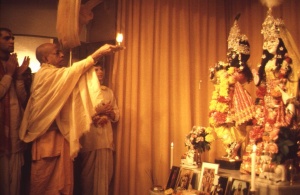SB 6.7.40: Difference between revisions
m (Text replacement - "==== <div class=" to "==== <div class=") |
(Vanibot #0054 edit - transform synonyms into clickable links, which search similar occurrences) |
||
| Line 23: | Line 23: | ||
<div class="synonyms"> | <div class="synonyms"> | ||
''yayā'' | ''[//vanipedia.org/wiki/Special:VaniSearch?s=yayā&tab=syno_o&ds=1 yayā]'' — by which; ''[//vanipedia.org/wiki/Special:VaniSearch?s=guptaḥ&tab=syno_o&ds=1 guptaḥ]'' — protected; ''[//vanipedia.org/wiki/Special:VaniSearch?s=sahasra&tab=syno_o&ds=1 sahasra]-[//vanipedia.org/wiki/Special:VaniSearch?s=akṣaḥ&tab=syno_o&ds=1 akṣaḥ]'' — the thousand-eyed demigod, Indra; ''[//vanipedia.org/wiki/Special:VaniSearch?s=jigye&tab=syno_o&ds=1 jigye]'' — conquered; ''[//vanipedia.org/wiki/Special:VaniSearch?s=asura&tab=syno_o&ds=1 asura]'' — of the demons; ''[//vanipedia.org/wiki/Special:VaniSearch?s=camūḥ&tab=syno_o&ds=1 camūḥ]'' — military power; ''[//vanipedia.org/wiki/Special:VaniSearch?s=vibhuḥ&tab=syno_o&ds=1 vibhuḥ]'' — becoming very powerful; ''[//vanipedia.org/wiki/Special:VaniSearch?s=tām&tab=syno_o&ds=1 tām]'' — that; ''[//vanipedia.org/wiki/Special:VaniSearch?s=prāha&tab=syno_o&ds=1 prāha]'' — spoke; ''[//vanipedia.org/wiki/Special:VaniSearch?s=saḥ&tab=syno_o&ds=1 saḥ]'' — he; ''[//vanipedia.org/wiki/Special:VaniSearch?s=mahendrāya&tab=syno_o&ds=1 mahendrāya]'' — unto the King of heaven, Mahendra; ''[//vanipedia.org/wiki/Special:VaniSearch?s=viśvarūpaḥ&tab=syno_o&ds=1 viśvarūpaḥ]'' — Viśvarūpa; ''[//vanipedia.org/wiki/Special:VaniSearch?s=udāra&tab=syno_o&ds=1 udāra]-[//vanipedia.org/wiki/Special:VaniSearch?s=dhīḥ&tab=syno_o&ds=1 dhīḥ]'' — very broad-minded. | ||
</div> | </div> | ||
Latest revision as of 22:45, 18 February 2024

His Divine Grace
A.C. Bhaktivedanta Swami Prabhupada
A.C. Bhaktivedanta Swami Prabhupada
TEXT 40
- yayā guptaḥ sahasrākṣo
- jigye 'sura-camūr vibhuḥ
- tāṁ prāha sa mahendrāya
- viśvarūpa udāra-dhīḥ
SYNONYMS
yayā — by which; guptaḥ — protected; sahasra-akṣaḥ — the thousand-eyed demigod, Indra; jigye — conquered; asura — of the demons; camūḥ — military power; vibhuḥ — becoming very powerful; tām — that; prāha — spoke; saḥ — he; mahendrāya — unto the King of heaven, Mahendra; viśvarūpaḥ — Viśvarūpa; udāra-dhīḥ — very broad-minded.
TRANSLATION
Viśvarūpa, who was most liberal, spoke to King Indra [Sahasrākṣa] the secret hymn that protected Indra and conquered the military power of the demons.
Thus end the Bhaktivedanta purports to the Sixth Canto, Seventh Chapter, of the Śrīmad-Bhāgavatam, entitled "Indra Offends His Spiritual Master, Bṛhaspati."